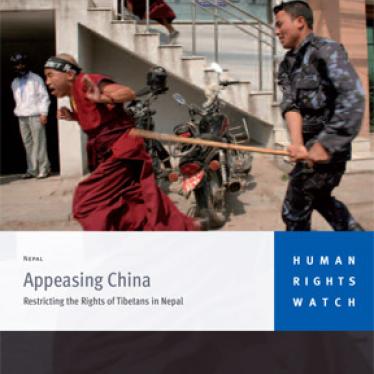On Dec. 18, prosecutors from the U.S. Justice Department charged a China-based Zoom executive with conspiring to terminate Zoom meetings this year that commemorated the 1989 Tiananmen Square Massacre at the Chinese government’s behest. The 47-page complaint contains detailed exchanges between the executive and employees at Zoom’s California headquarters this year.
It was a fascinating read, not least because few global tech companies that do business in China have ever made public the details of their communications with Chinese authorities on censorship issues, despite repeated calls to do so from human rights organizations and United Nations experts.
What the complaint reveals is Beijing’s aggressive pursuit of global censorship of topics deemed sensitive or critical of Beijing, and Zoom’s failure to adequately protect its users’ rights to free expression and privacy.
In May, the China-based Zoom executive, Xinjiang Jin, who served as a government affairs liaison, contacted employees at Zoom’s headquarters about the massacre's anniversary on June 4. The anniversary is one of the most censored events in China, and Jin told his colleagues in the U.S. that the “internet police” in China had increased pressure on Zoom to censor politically sensitive content of Chinese users no matter where they were.
According to the document, Jin said that China “has implemented real-name registration/verification, so there are not many that do bad things anymore. All are from the U.S., if we don’t handle them well, net security will ban all overseas servers, so I respectfully ask you to take this seriously.”
A U.S.-based colleague obliged: “We will hurry and ban all the free accounts from US04,” referring to the name of a Zoom server.
Beijing has long leveraged market access to compel foreign tech companies to meet its censorship demands, whether in China or abroad. Apple has removed hundreds of virtual private network (VPN) apps from China’s App Store. In 2019, it also removed a mapping app widely used by pro-democracy protesters in Hong Kong from the App Store.
LinkedIn blocked content critical of Chinese authorities for users in China. From the complaint, one can see Zoom’s fear that if it didn’t terminate meetings or suspend accounts upon request, it risked having its China operation shut down at any time, which loomed large in all of its decisions.
Companies understandably want access to China’s huge market, but they also have a responsibility to respect human rights under the United Nations Guiding Principles on Business and Human Rights. Zoom said publicly that it is “dedicated to the free and open exchange of ideas,” but when Jin repeatedly framed speech critical of the Chinese government as something that could “do bad things” or “illegal activities,” and demanded they be censored, he met no resistance or got any questions from his colleagues at headquarters.
Besides conveying Chinese authorities’ demands and threats to Zoom’s headquarters, Jin was also shutting down meetings on behalf of Beijing in a more deceitful way.
When a private June 3 Tiananmen commemoration meeting was in motion, some emails were sent to Zoom’s public, generic U.S.-based complaint email account, alleging that the meeting contained content supporting terrorism, inciting violence or distributing child pornography. (An FBI investigation later found that no user accounts associated with the email addresses from which the complaint was filed actually participated in the meeting.)
Jin, who had no access to that generic complaint account, concurrently alerted his U.S.-based colleague of the complaints. The colleague quickly terminated the meeting and suspended the host account without any investigation into the matter.
For a public meeting on June 4, Jin suggested to his U.S.-based colleague, “It’s a public meeting, so we could join and report to Zoom [U.S.] as [an] abus[ive] meeting, then you [in the] U.S. may have evidence to suspend it.” Upon receiving Jin’s message, the colleague terminated the account used to host the meeting. Soon after the organizer of the meeting restarted the meeting in another room using a different account, some Zoom accounts with avatars of naked women and the flag of the Islamic State group joined the meeting.
Around the same time, emails were sent to Jin reporting these accounts for “inciting violence” or “pornography.” Jin relayed those emails to his U.S.-based colleague who then terminated the meeting again and suspended the new account.
So in order to justify shutting down legitimate meetings hosted in the U.S., a China-based Zoom executive was running schemes to trigger a violation of Zoom’s terms of service, and a U.S.-based Zoom employee, knowing they were schemes, facilitated it.
Earlier in the chat between Jin and the U.S. employee, Jin suggested that, instead of suspending the host account, they could put the account in “quarantine” for 24 hours, as if Zoom was having technical issues. It therefore seems reasonable to say that the U.S. employee was aware of the schemes. Second, the schemes have so many other holes (detailed in the complaint), it’s hard to imagine the U.S. side wouldn’t detect them if they actually wanted to.
All these events not only raise serious questions about what kind of oversight Zoom has over requests for censorship and user data, but also over staff who handle such requests. One also has to wonder, to what extent Zoom’s top leadership knew about them? Zoom said in a statement that the company only learned about Jin’s violations of Zoom’s policies during an internal investigation it initiated after the incidents became public. Zoom said it had terminated Jin’s employment and placed other employees on administrative leave.
Going forward, Zoom said it will not allow requests from the Chinese government to affect anyone outside of mainland China, but said nothing about protecting the rights of its users in the country.
For the past 31 years, the Chinese government has scrubbed any mentions of the Tiananmen Square Massacre from the Chinese internet, imprisoned and harassed numerous activists and writers who dared to talk about it, and restricted the movement and communication of the families of victims. The censorship of the event has been so successful that most young people in the country today do not know it happened.
I personally know some of the participants in the aforementioned meetings. Some were student leaders of the protests and some were parents of people killed in the ensuing massacre. They are the most courageous people I know. Despite facing extraordinary repression over the past three decades, they have chosen to continue to speak out. And this is how Zoom treated them.
Statements about being committed to free expression and human rights are empty promises unless companies enact policies and conduct due diligence, making sure they’re respecting human rights and mitigating harm. This especially applies to companies that operate in different countries and cultures. A company can’t say it stands for rights and then unfailingly do the bidding of the Chinese Communist Party.
The party is increasingly a threat to the human rights of people everywhere. Not only Zoom, but all tech companies who do business in China need to think about what kind of role they want to play in the history of justice and human rights.









